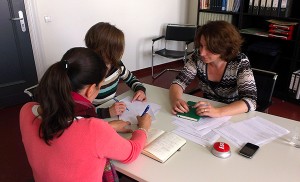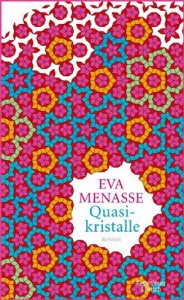or “Being who I am”
“The night before I fly to Germany to see my grandfather Mosha, I meet someone, take him home with me, and for the first time in my life, I sleep with a man.”

© weissbooks.w
Frankfurt am Main
This sentence begins the first chapter of the 2010 novel Sag es mir (Tell it to me) by Vanessa F. Fogel. The author was born in 1981 in Frankfurt and grew up in Israel. She introduces the first-person narrator of this autobiographical novel both as a granddaughter and as a confident young woman right from the start. And despite her imminent trip to the sites of extermination – she meets her grandfather in Berlin and they travel together to Poland – her emphasis is on vitality and the joys of living.
The Frankfurt publishing house weissbooks has now taken on another Jewish writer of “the third generation.” Channah Trzebiner is a lawyer, also born in 1981 in Frankfurt, where, unlike Fogel, she still lives. She has written Die Enkelin (The Granddaughter), which is more of “a kind of inner monologue” than a novel. This book also begins confidently: “I accept the woman that I am.” At once, however, the author alerts her reader to the difficult process underlying this claim:
“For years I cut off my connection to the innermost ‘I’ […], so that I could be the substitute for a life ended by murder. How I could have done otherwise? I’m called Channah after my grandmother’s youngest sister […].”
→ continue reading
The Blog’s Editorial Staff in Discussion (Part II)

Meeting of the website editors
© Jewish Museum Berlin, photo: Michael Butschkau
Naomi Lubrich: We recently talked together about Eva Menasse’s novel Quasicrystals but we haven’t decided which of us will write a review of the book for our blog. Personally I would be interested in doing it, and I have something to say not only about the Jewish theme but also about Menasse’s image of women, that I found to be unrealistically and ideationally drawn. Xane is a downright caricature of a “high-powered woman”: a caring mother and stepmother of three children with, to some extent, behavioral problems. And at the same time she’s a leading film artist and influential intellectual. On top of all this she has a harmonious, uncomplicated marriage, and she even gets involved with a number of other men… → continue reading
A Talk about Jewish Questions, the Lives of Women, and Expectations of Literature
 This blog is edited by three women, all of whom are between their mid-30s and 40. They all studied literature, and try to reconcile to one another their commitment to their profession, their interests, and their private lives. At the center of the latest novel by Eva Menasse, Quasikristalle (2013, ‘Quasicrystals’), is Xane Molin, an at first younger, and then progressively older woman trying to square her career with her wish to be there for her children and to live a good life. In each chapter Quasicrystals takes a different look at her life – and we take different looks at the novel in our discussion here.
This blog is edited by three women, all of whom are between their mid-30s and 40. They all studied literature, and try to reconcile to one another their commitment to their profession, their interests, and their private lives. At the center of the latest novel by Eva Menasse, Quasikristalle (2013, ‘Quasicrystals’), is Xane Molin, an at first younger, and then progressively older woman trying to square her career with her wish to be there for her children and to live a good life. In each chapter Quasicrystals takes a different look at her life – and we take different looks at the novel in our discussion here.
Mirjam Bitter: Since in German substantives referring to persons are not gender-neutral, I re-named our blog’s literature series from the masculine “junge jüdische Autoren”, in more gender-neutral German, to “junge jüdische Autorinnen und Autoren,” that is, “young Jewish women and men authors.” In doing that, it occurred to me that, so far, we have only talked about male authors. What do you think about introducing a woman next?
Mirjam Wenzel: I’m reading Quasicrystals at the moment, by Eva Menasse, and I’m curious what you all think about the book. → continue reading


